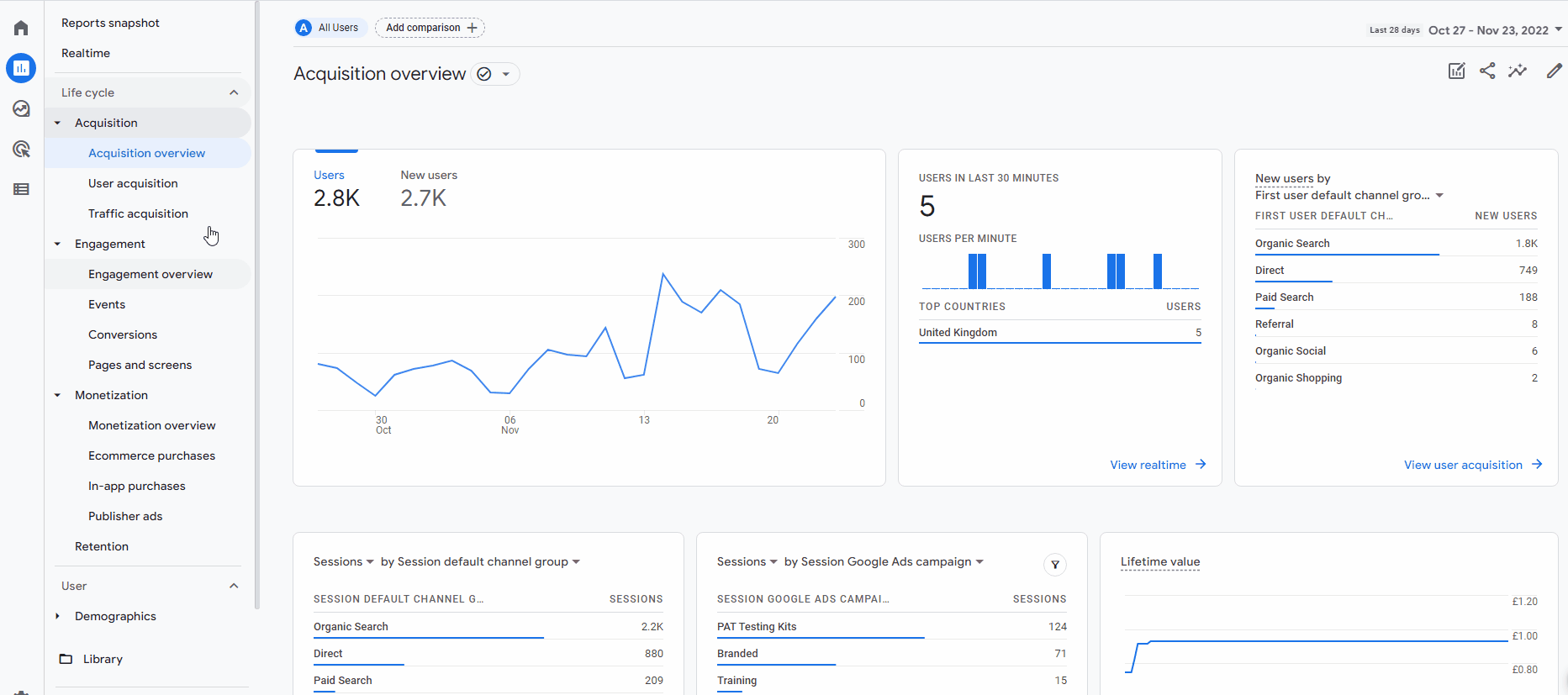 01392 914033
Offices are currently closed
01392 914033
Offices are currently closed
It’s that time of year where change is in the air. However, this time, we aren’t talking about the cold nights and dark mornings – rather, the upcoming takeover of Google Analytics 4 (GA4) from Universal Analytics (UA).
Marketers, SEO experts and those in the digital industries will already be well informed of the transition from Google Universal Analytics (also known as UA tracking), to Google Analytics 4 that will be happening July 1 2023. What Google states as the ‘next-generation measurement solution’ has become a talking point in the marketing industry since its inception earlier this year. Many are still getting to grips with the new-look interface, reporting metrics and acknowledging that many of the old-time features and elements have been stripped, leaving behind a somewhat clean and modern way of reporting.
As a leading marketing agency in Exeter, it’s important that we adapt to and collaborate with the new-look platform that allows us to report on client success. Below, we discuss what the phase-out of UA and what the implementation of GA4 means to marketers.
With the gradual phase-out of UA leading up to a full GA4 take-over in July 2023, marketers were recommended to start setting up their GA4 accounts, well-ahead of the full release. Having a year’s worth of data behind your clients’ (or your own) websites this time next year will not only give you time to suss out and educate yourselves on the new elements of GA4, but also allow you to compare data year on year, which is the backbone of setting KPIs and future strategy.

The main worry for marketers when the GA4 rollout was introduced was that all historic data stored in UA would be wiped once the full transition was complete. It wouldn’t have been a surprise if marketers were annoyed by this when the announcement was first made, especially if their client’s had several years worth of data behind them!
However, as the industry evolves and data is required to be more accurate, especially in the upcoming ‘cookie-less’ world – where data and third-party data processing will decline in extent, availability, quantity and quality – marketers will see a huge shift in how the world organises and analyses data, across multiple channels, including Google Ads, paid social marketing and more.
How does the decline in cookies relate to GA4, I hear you ask? Well, since GA4 is engineered with machine learning and statistical modelling in mind, it has been designed to be used with or without cookies – allowing advertisers to leverage their campaigns without worrying about gaps forming in their data across session channels.
As Google says: “Because the technology landscape continues to evolve, The new Analytics is designed to adapt to a future with or without cookies. It uses a flexible approach to measurement, and in the future, will include modeling to fill in the gaps where the data may be incomplete.”
If you have experience in using Google Data Studio, you’ll know how great it can be for automated, branded and in-depth reporting for your clients. Luckily, with GA4, Google has reporting integrated into individual dashboards, allowing for accurate and efficient reporting from a click of a button, removing the old-age exporting to Google sheets that UA offers.

Immediately in the left-hand navigation of GA4, you have the standard GA4 reports. These are built-in card reports that you can customise depending on the data you wish to analyse at a glance, with the added ability to download as PDF or CSv files. You also have the real-time data set, which shows you data from across Life Cycles (explained below) at the current moment in time.
Over time, you can then develop a dashboard that syncs automatically to the day-to-day (or historic/comparison) data that you wish to collect, at a blink of an eye. GA4 standard reports are broken down into two categories (or collections):
For each of the Life Cycle menus that appear in the GA4 dashboard, you can create individual reports. These include:
-Acquisition overview
-User acquisition
-Traffic Acquisition
-Overview
-Events
-Conversions
-Pages & Screens
-Overview
-Ecommerce purchases
-In-app purchases
-Publisher ads
Marketing can be overwhelming for businesses of all sizes, especially if you’re a newcomer to your industry and don’t know where to start. Although we only touched on the very tip of a big GA4 iceberg in this article, there is no need to worry when it comes to marketing your business online.
The real take-away is making sure you have the GA4 credentials in place to make informed decisions for your business digitally now, will put you in good stead in the future.
Our friendly and highly-knowledgeable marketing professionals in Exeter can help develop an online strategy that meets your requirements and budget, setting you on the path to success. Would you like to learn more about data analysis and how it can transform your appearance online? Make the step from Google UA to GA4 easily with Media Street today. Call our team on 01392 914033 or email [email protected] for more information.